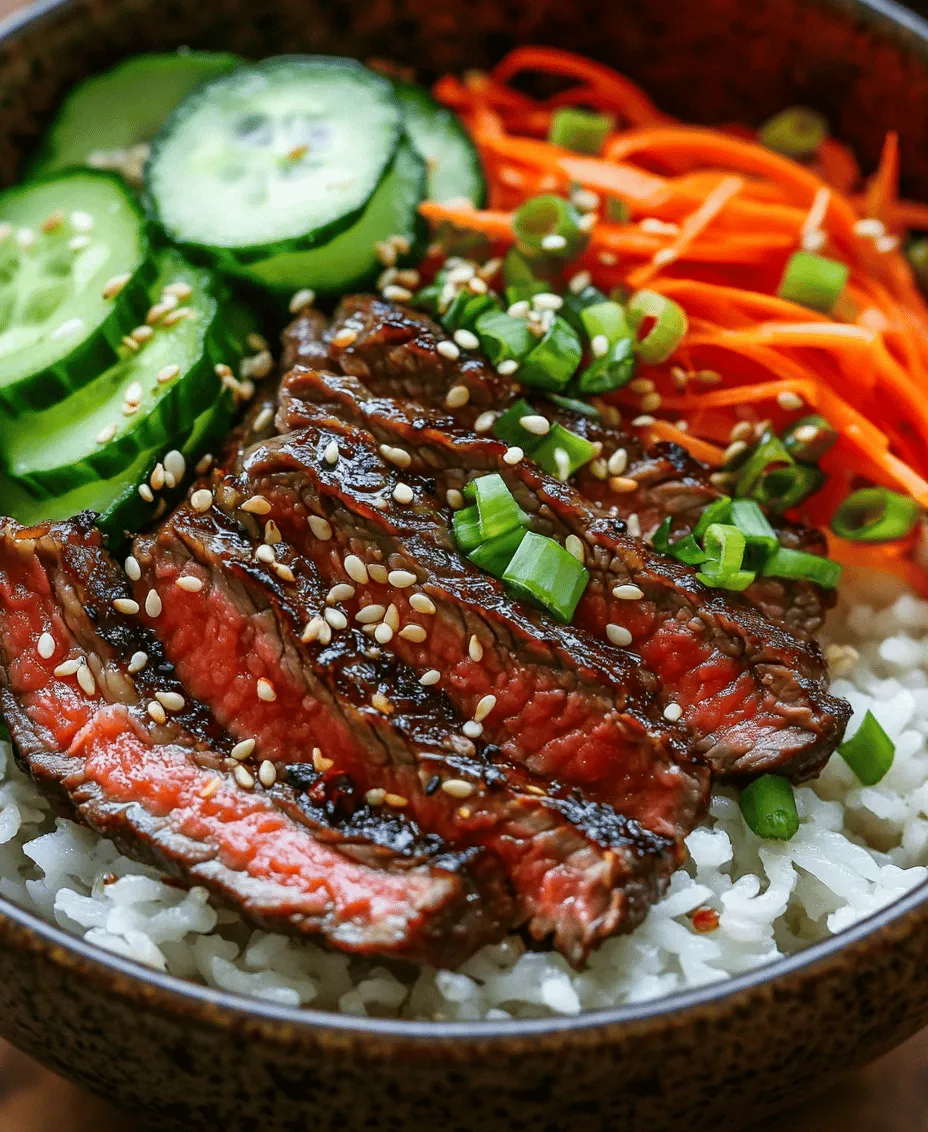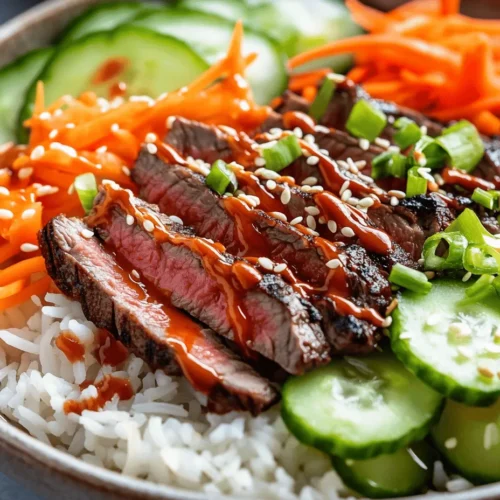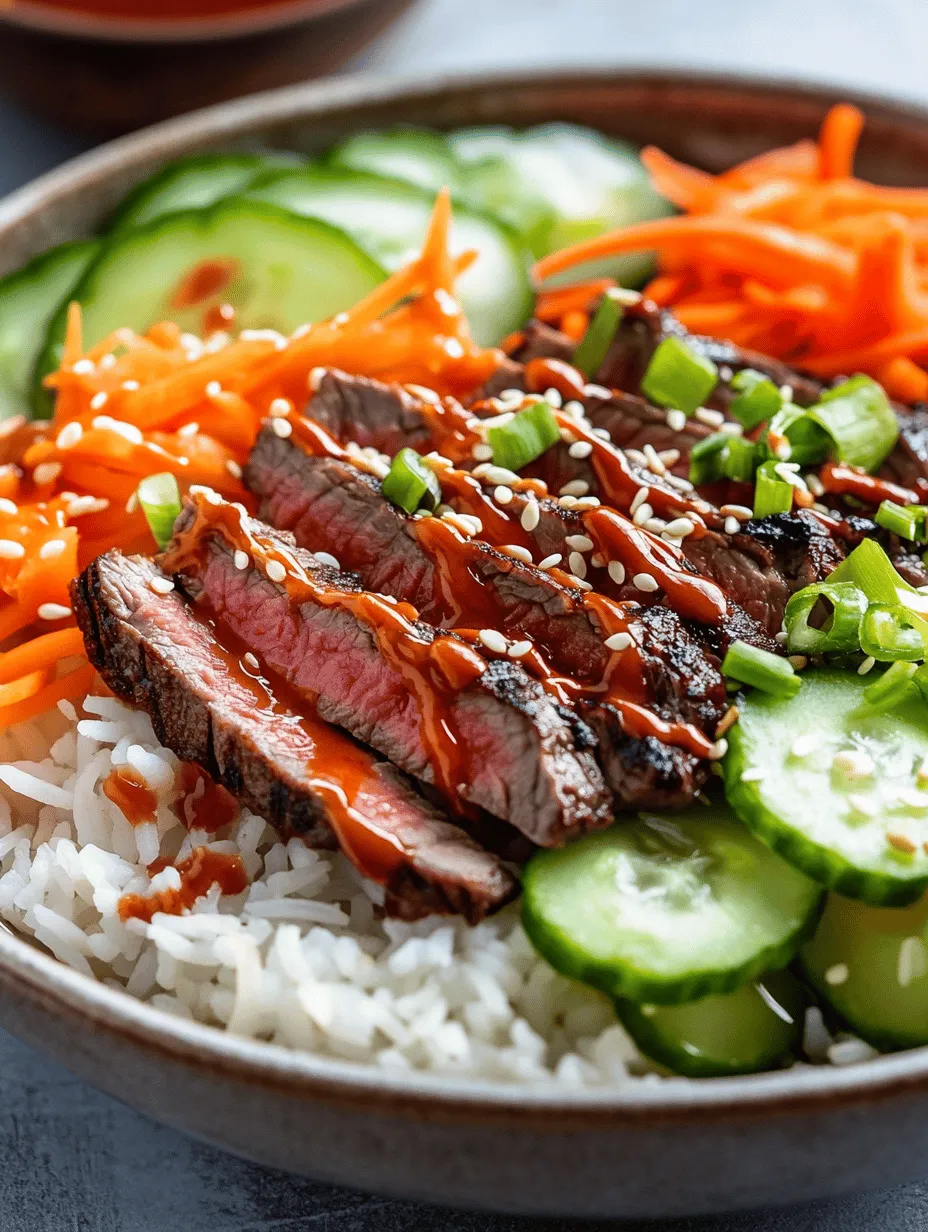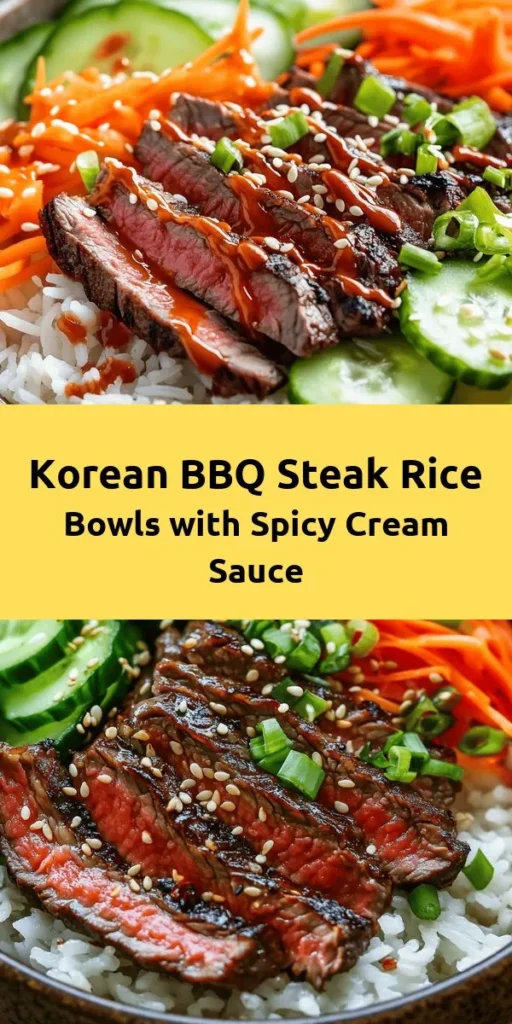Introduction
Korean BBQ has become a culinary sensation, captivating taste buds around the world and making its way into home kitchens. This vibrant and flavorful cooking style is not just a meal; it’s an experience that brings people together, often centered around sizzling meats and a variety of side dishes. Among the many delightful options, Korean BBQ steak rice bowls stand out as a versatile meal that seamlessly combines savory flavors with the crunch of fresh vegetables.
The beauty of steak rice bowls lies in their adaptability; they can be customized to suit various tastes and dietary preferences, making them an ideal choice for family dinners or casual get-togethers. This particular recipe balances the sweetness of the marinade, the spice from the accompanying sauce, and the umami flavor of the grilled steak, resulting in a dish that is both satisfying and memorable. Whether you’re hosting friends or simply treating yourself, these Korean BBQ steak rice bowls with spicy cream sauce promise to deliver a burst of flavor in every bite.
Understanding Korean BBQ
Korean BBQ, known as “gogi-gui” in Korea, translates to “meat roast.” This culinary practice has deep roots in Korean culture, with historical references dating back to the Goguryeo era (37 BC – 668 AD). Traditionally, Korean BBQ involves grilling marinated meats, such as beef, pork, and chicken, over an open flame. The communal aspect of this dining experience fosters connection and conversation, as families and friends gather around the table to grill their food and share it with one another.
At the heart of Korean BBQ is the art of marinating. The marinade typically incorporates a harmonious blend of soy sauce, sugar, garlic, and various spices, which not only enhances the meat’s flavor but also tenderizes it. This process allows the flavors to penetrate deeply into the meat, creating a delicious and memorable dish. The popularity of Korean BBQ has transcended borders, influencing global cuisine and inspiring chefs and home cooks alike to experiment with its robust flavors and unique cooking techniques.
Ingredient Breakdown
To create the perfect Korean BBQ steak rice bowls, it’s essential to understand the key ingredients that contribute to the dish’s rich taste and texture. Let’s take a closer look at each component:
Flank Steak
Flank steak is a preferred cut for Korean BBQ due to its rich flavor and fibrous texture. It’s relatively lean compared to other cuts, making it ideal for marinating and grilling. When cooked properly, flank steak is tender and juicy, absorbing the marinade beautifully. This cut can be sliced thinly against the grain, ensuring each bite is flavorful and easy to chew.
Marinade Components
The marinade is the heart of this dish, and it consists of several flavorful ingredients:
– Soy Sauce: A staple in Korean cooking, soy sauce adds a savory depth to the marinade. It’s rich in umami, enhancing the overall flavor of the steak.
– Brown Sugar: This ingredient contributes sweetness, which balances the saltiness of the soy sauce and caramelizes during grilling, resulting in a beautifully charred exterior.
– Sesame Oil: A few drops of sesame oil impart a nutty aroma and flavor, elevating the dish to new heights.
– Rice Vinegar: This ingredient adds a tangy note, which helps break down the meat fibers, making the steak more tender.
– Garlic: Fresh garlic provides a bold flavor, infusing the marinade with its distinctive pungency.
– Ginger: The warmth of ginger complements the other flavors and adds a fragrant note.
– Black Pepper and Red Pepper Flakes: These spices introduce a subtle heat that enhances the overall flavor profile, making the dish excitingly complex.
Vegetable Choices
Fresh vegetables are crucial for adding texture, color, and nutritional value to the rice bowls. Here are some great options:
– Cucumbers: Crisp and refreshing, cucumbers provide a cooling contrast to the spicy elements of the dish.
– Carrots: Shredded carrots add a touch of sweetness and a vibrant orange hue, making the dish visually appealing.
– Bell Peppers: These colorful vegetables contribute crunch and a mild sweetness, balancing the savory flavors of the steak.
– Bean Sprouts: Often used in Korean cuisine, bean sprouts offer a delightful crunch and are rich in vitamins and minerals.
– Green Onions: Sliced green onions not only add a fresh flavor but also serve as a beautiful garnish that enhances the overall presentation.
Spicy Cream Sauce Ingredients
The spicy cream sauce is what truly sets these rice bowls apart. Its creamy texture and kick of heat create a delicious contrast to the grilled steak. The key ingredients include:
– Mayonnaise: This base provides a rich and creamy texture, serving as the foundation for the sauce.
– Gochujang: This Korean red chili paste adds both heat and depth of flavor, making the sauce irresistibly savory.
– Honey: A touch of honey balances the spice from gochujang with its natural sweetness, creating a harmonious blend.
– Lime Juice: Fresh lime juice adds acidity, brightening up the sauce and enhancing its flavor profile.
Marinating the Steak
Marinating the steak is a crucial step in achieving a flavorful and tender dish. The marinating process allows the steak to absorb the aromatic flavors of the marinade, resulting in a depth of taste that is characteristic of Korean BBQ.
Step-by-Step Instructions for Preparing the Marinade
1. Combine the Marinade Ingredients: In a mixing bowl, whisk together soy sauce, brown sugar, sesame oil, rice vinegar, minced garlic, grated ginger, black pepper, and red pepper flakes until well combined. Ensure the brown sugar is fully dissolved for an even distribution of flavor.
2. Prepare the Flank Steak: Place the flank steak in a large resealable plastic bag or a shallow dish. Pour the marinade over the steak, ensuring it is completely covered. If using a bag, seal it tightly, removing as much air as possible. If using a dish, cover it with plastic wrap.
3. Marinate the Steak: Refrigerate the marinating steak for at least 1 hour, but preferably 4 to 6 hours for optimal flavor absorption. For best results, marinate overnight if time allows. The longer the steak marinates, the more flavorful and tender it becomes.
Optimal Marinating Times and Conditions
While marinating for a short time (around 1 hour) can impart good flavor, the ideal marinating time is between 4 to 6 hours. For those who plan ahead, marinating overnight will result in a steak that is exceptionally tender and packed with flavor. When marinating, it’s important to keep the steak refrigerated to prevent bacterial growth.
Tips on Flavor Penetration
To enhance flavor penetration even further, consider scoring the surface of the flank steak lightly with a sharp knife. This technique allows the marinade to seep deeper into the meat, ensuring that every bite is bursting with flavor.
As you prepare your ingredients and begin marinating the steak, you’re on your way to creating a dish that embodies the essence of Korean BBQ. The tantalizing aroma of the marinated steak combined with the freshness of the vegetables and the kick of the spicy cream sauce will undoubtedly make this meal a favorite in your household.
Stay tuned for the next part of this recipe, where we will explore how to prepare the spicy cream sauce and assemble the complete Korean BBQ steak rice bowls.

Adjusting the Spiciness Level
One of the beauties of the Spicy Cream Sauce in our Korean BBQ Steak Rice Bowls is its adaptability. You can easily adjust the heat according to your personal preference or those of your guests. If you prefer a milder flavor, reduce the amount of gochujang (Korean chili paste) in the sauce. Start with just a teaspoon and gradually increase until you reach your desired spice level.
For those who crave a bit more heat, consider adding a dash of cayenne pepper or a sprinkle of crushed red pepper flakes to the sauce. These additions can amplify the spiciness without altering the overall flavor profile too much. Additionally, serving Sriracha or a spicy kimchi on the side allows your guests to customize their bowls further, enhancing their dining experience.
Versatility of the Sauce
Beyond these delicious rice bowls, the Spicy Cream Sauce is a versatile condiment that can elevate various dishes. It pairs excellently with grilled chicken, roasted vegetables, or even as a dipping sauce for fresh spring rolls. Consider using it as a dressing for salads or drizzling it over baked potatoes for a spicy twist. The creamy texture combined with the kick of spice makes it a favorite in many culinary applications, allowing you to enjoy its vibrant flavor well beyond this recipe.
Cooking the Steak
Cooking the steak to perfection is crucial for the ultimate Korean BBQ experience. Here’s a comprehensive guide to ensure your steak comes out tender, juicy, and full of flavor.
Ideal Cooking Methods: Grill Pan vs. Skillet
Both grill pans and skillets are excellent options for cooking steak, but they offer different benefits. A grill pan will give you those attractive grill marks and a bit of smoky flavor, while a skillet allows for a more even cook due to its flat surface.
1. Grill Pan: Preheat your grill pan on medium-high heat. The key is to make sure it’s hot enough before adding the steak to achieve a nice sear.
2. Skillet: If using a skillet, opt for a cast iron or stainless steel pan as they retain heat well. Heat the pan over medium-high heat until it’s hot, then add a tablespoon of oil to prevent sticking.
Cooking Times for Varying Levels of Doneness
The cooking time will depend on the thickness of your steak and your preferred level of doneness. Here are general guidelines for a 1-inch thick steak:
– Rare: 2-3 minutes per side (internal temperature of 120-125°F)
– Medium Rare: 3-4 minutes per side (internal temperature of 130-135°F)
– Medium: 4-5 minutes per side (internal temperature of 140-145°F)
– Medium Well: 5-6 minutes per side (internal temperature of 150-155°F)
– Well Done: 6-7 minutes per side (internal temperature of 160°F and above)
Use a meat thermometer for the most accurate results. Remember to let the steak rest for about five minutes after cooking; this allows the juices to redistribute, keeping your steak juicy.
Slicing Techniques for Maximum Tenderness and Presentation
Once your steak has rested, it’s time to slice it. The way you cut the steak can significantly affect its tenderness and presentation. Always slice against the grain—this means cutting perpendicular to the direction of the muscle fibers. This technique shortens the fibers, making each bite more tender.
For an appealing presentation, aim for thin, even slices. Arrange them neatly over your rice bowls, fanning them out slightly to showcase the beautiful color and texture of the meat.
Assembling the Rice Bowls
Assembling your Korean BBQ Steak Rice Bowls is where all your hard work comes together in a visually stunning and delicious meal.
Order of Layering Ingredients
Start with a base of fluffy rice, which can be white, brown, or even cauliflower rice for a low-carb option. Next, add a generous portion of your sliced steak, followed by the vibrant Spicy Cream Sauce drizzled over the top. This order ensures that the sauce seeps into the rice and meat, enhancing each bite.
Next, layer on your choice of vegetables. Fresh cucumbers, shredded carrots, and radishes add crunch and color. Finally, sprinkle sesame seeds and sliced green onions on top for a touch of elegance and additional flavor.
Importance of Presentation
Presentation plays a crucial role in enhancing the dining experience. A well-assembled bowl not only looks appetizing but also creates anticipation for the meal. Use contrasting colors and textures to make each ingredient stand out.
Consider using clear bowls or plates to show off the layers. You might also serve the rice bowls family-style, allowing everyone to customize their bowls at the table, which adds to the communal dining experience.
Personalizing the Bowls
Feel free to personalize your rice bowls based on your preferences or what you have on hand. Adding sliced avocado can provide creaminess, while swapping in different vegetables like sautéed bok choy or steamed broccoli introduces variety. You can even add a fried egg on top for added richness and a touch of Korean flair.
Serving Suggestions
When it comes to serving your Korean BBQ Steak Rice Bowls, consider the entire dining experience. Here are some ideas to elevate your meal:
Pairing Options
For side dishes, consider serving pickled vegetables, like kimchi or pickled radishes, which complement the rich flavors of the steak and sauce. A light, refreshing cucumber salad can balance the meal’s richness perfectly.
As for beverages, a chilled Korean rice wine, such as Makgeolli, pairs wonderfully with these flavors. Alternatively, a crisp lager or a refreshing iced tea can cleanse the palate.
Family-Style Serving
For gatherings or family meals, consider serving the rice bowls family-style. Set up a buffet with all the ingredients laid out in bowls, allowing everyone to build their own bowls according to their preferences. This approach not only makes it interactive but also encourages conversation and shared experiences around the table.
If you’re meal prepping for the week, these rice bowls can be assembled ahead of time. Store the sauce separately to prevent the rice from getting soggy, and simply reheat when you’re ready to enjoy a quick, satisfying meal.
Nutritional Analysis
The ingredients in these Korean BBQ Steak Rice Bowls not only create a delicious dish but also provide a well-rounded nutritional profile:
– Protein: The steak offers a hearty serving of protein, essential for muscle building and repair.
– Carbohydrates: Rice serves as a great source of energy, providing the necessary carbohydrates for an active lifestyle.
– Healthy Fats: Depending on your additions, such as avocado or sesame seeds, you can incorporate healthy fats that are important for overall health.
– Vitamins and Minerals: Fresh vegetables add essential vitamins and minerals, contributing to a balanced diet. Ingredients like cucumbers and carrots are rich in antioxidants and can promote skin health.
Conclusion
Korean BBQ Steak Rice Bowls with Spicy Cream Sauce are more than just a meal; they represent a culinary experience that brings together vibrant flavors, textures, and colors. The ease of preparation allows you to enjoy this delightful dish any night of the week, while the versatility of the ingredients lets you personalize it to your taste.
Encourage readers to experiment with the recipe, trying different vegetables, proteins, or spice levels to make it their own. Emphasize that cooking should be a fun and creative process—one that can bring family and friends together around the table. Whether you are enjoying a quiet dinner or hosting a lively gathering, these rice bowls are sure to impress and satisfy, making them a favorite in your culinary repertoire.



